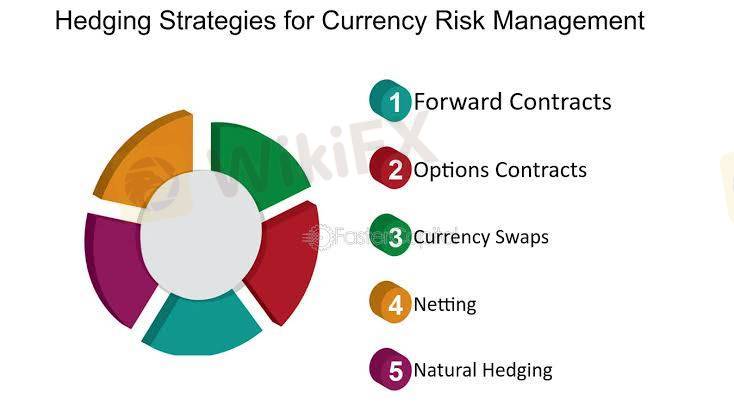
2025-02-12 16:47
IndustriyaCurrency Risk Management
#firstdealoftheneeyearastylz
Currency risk management refers to the practices and strategies used to mitigate the risks associated with fluctuations in currency exchange rates. Here's an overview:
Types of Currency Risk:
1. Transaction risk: risk of exchange rate fluctuations affecting the value of future cash flows.
2. Translation risk: risk of exchange rate fluctuations affecting the value of assets and liabilities.
3. Economic risk: risk of exchange rate fluctuations affecting the competitiveness of a company.
Currency Risk Management Strategies:
1. Hedging: using derivatives, such as forward contracts, options, and swaps, to lock in exchange rates.
2. Currency diversification: diversifying investments and revenues across multiple currencies.
3. Currency matching: matching assets and liabilities in the same currency.
4. Currency overlay: using a separate currency overlay strategy to manage currency risk.
5. Natural hedging: using business operations to naturally hedge currency risk.
Currency Risk Management Tools:
1. Forward contracts: binding agreements to buy or sell currency at a set rate.
2. Options: contracts giving the holder the right to buy or sell currency at a set rate.
3. Swaps: agreements to exchange cash flows in different currencies.
4. Futures: standardized contracts to buy or sell currency at a set rate.
5. Currency options and futures exchanges.
Best Practices for Currency Risk Management:
1. Identify and assess currency risk exposure.
2. Develop a currency risk management strategy.
3. Monitor and adjust the strategy as needed.
4. Use a combination of risk management tools.
5. Continuously review and improve the risk management process.
By implementing effective currency risk management strategies, companies can reduce their exposure to currency fluctuations and protect their financial performance.
Katulad 0

Odogwu920
Mga brokers
Mainit na nilalaman
Pagsusuri ng merkado
Dogecoin cheers coinbase listing as Bitcoin’s range play continues
Pagsusuri ng merkado
Grayscale commits to converting GBTC into Bitcoin ETF:
Pagsusuri ng merkado
Bitcoin's price is not the only number going up
Pagsusuri ng merkado
Theta Price Prediction:
Pagsusuri ng merkado
How to Research Stocks:
Pagsusuri ng merkado
Bitcoin (BTC), Ethereum (ETH) Forecast:
Kategorya ng forum

Plataporma

Eksibisyon

Ahente

pangangalap

EA

Industriya

Merkado

talatuntunan
Currency Risk Management
 Hong Kong | 2025-02-12 16:47
Hong Kong | 2025-02-12 16:47#firstdealoftheneeyearastylz
Currency risk management refers to the practices and strategies used to mitigate the risks associated with fluctuations in currency exchange rates. Here's an overview:
Types of Currency Risk:
1. Transaction risk: risk of exchange rate fluctuations affecting the value of future cash flows.
2. Translation risk: risk of exchange rate fluctuations affecting the value of assets and liabilities.
3. Economic risk: risk of exchange rate fluctuations affecting the competitiveness of a company.
Currency Risk Management Strategies:
1. Hedging: using derivatives, such as forward contracts, options, and swaps, to lock in exchange rates.
2. Currency diversification: diversifying investments and revenues across multiple currencies.
3. Currency matching: matching assets and liabilities in the same currency.
4. Currency overlay: using a separate currency overlay strategy to manage currency risk.
5. Natural hedging: using business operations to naturally hedge currency risk.
Currency Risk Management Tools:
1. Forward contracts: binding agreements to buy or sell currency at a set rate.
2. Options: contracts giving the holder the right to buy or sell currency at a set rate.
3. Swaps: agreements to exchange cash flows in different currencies.
4. Futures: standardized contracts to buy or sell currency at a set rate.
5. Currency options and futures exchanges.
Best Practices for Currency Risk Management:
1. Identify and assess currency risk exposure.
2. Develop a currency risk management strategy.
3. Monitor and adjust the strategy as needed.
4. Use a combination of risk management tools.
5. Continuously review and improve the risk management process.
By implementing effective currency risk management strategies, companies can reduce their exposure to currency fluctuations and protect their financial performance.
Katulad 0
Gusto kong magkomento din
Ipasa
0Mga komento

Wala pang komento. Gawin ang una.

Ipasa
Wala pang komento. Gawin ang una.